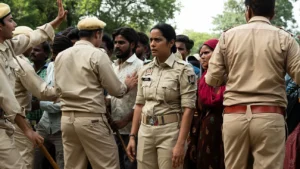
Director Lee Chang-dong’s Burning is one film that cannot be pinned down to a specific genre. The film lazily kicks off as an existential drama where two loners come in close contact, all by chance. Jong-soo (Yoo Ah-in) and Ha-emi (Jeon Jong-seo) look all things perfect when they make love in her rickety apartment. There are metaphors thrown in here and there, and one day Ha-emi zooms off to Africa. Interestingly, there is a moment where she quizzes the men in her life about what the word ‘metaphor’ meant – something that Jong-soo chooses not to answer. Instead, he heads to the bathroom.
Ha-emi claims to know Jong-soo from her childhood during which the only thing he seems to have told her is that she looked very ugly. With altered looks and renewed confidence, Ha-emi is attractive enough today to have Jong-soo say yes to her dinner date offer.
ALSO READ: ‘Border’ review – Explores genetic deformities to churn out a chilling genre-bending drama
The African journey is to satiate her ‘greater hunger’, says the young woman who dislikes her mundane job as a less glamorous version of what we call a cheerleader. She peels imaginary tangerines and is said to live with her cat Boil who, again, is never seen. Upon her return from the vacation, Ha-emi is accompanied by an attractive, wealthy and slightly older man called Ben (Steven Yeun). She seems to be courting him and the situation is a little hard to make sense of – for Jong-soo and for the viewers. Who is Ben? What was it that Ha-emi wanted from Jong-soo? Didn’t he mean anything to her than a brief exchange of hormones? This baffling and equally intriguing setting make way to the remaining reels of Burning, which is intoxicating with the unique ways that it blends each absurd element in the screenplay.
Based on the book ‘Barn Burning’ by Haruki Murakami, the proceedings get all the more puzzling during the trio’s subsequent meetings. Ben drives a Porsche Cayenne and Jong-soo roams in his mini truck. Class differences do not prevent Ben from paying a visit to Jong-soo’s wobbly house located alongside the North Korean border. In what is the film’s most arresting sequence, Ben also reveals to Jong-soo that his secret past-time is to set abandoned greenhouses on fire. The statement does not come out as a shocker since by now we have become used to the film’s pronounced absurdist traits. According to Ha-emi, Ben finds her ‘interesting’ which certainly does not seem to be the case as we see his unenthusiastic reaction to her over-enthusiastic demonstration of the ‘great hunger’. The scene, incidentally, is repeated in one of the later sequences. With his nattily done house and the mysterious objects in his bathroom, Ben’s characterization gives Burning the much-needed tautness. And then, one fine day, Ha-emi disappears.
Visualized predominantly from Jong-soo’s point of view, we follow his eyes with adept curiosity. Will he unravel the mystery around Ben? Will he find out the truth about Ha-emi’s disappearance? The screenplay aside, Chang-dong’s filmmaking style is markedly gloomy. The significant events unfold mostly towards the dusk or later. The mystery in the writing is amplified pointedly by the manner with which the editors (Kim Hyeon, Kim Da-won) intersect the incidents. Be it Jong-soo’s constant search for the burnt greenhouses or him following Ben to a lonely hill top, the frames chosen (and their respective durations) are spot-on.

It is also evident how Chang-dong is in no mood for closures. There are several occurrences that puzzle us – the crank telephone calls, the absence of the cat, the references to the well, Ben’s lifestyle – most of which do not end up finding concrete meanings in conventional cinematic sense. Burning catches on a definite whodunit tenor towards the latter reels but Chang-dong doesn’t let the film be just that. In fact, a conventional culmination would have sworn the film off a good amount of its enigma.
One subplot that didn’t appeal much to me was the one involving Jong-soo’s father. The angle, for some reason, lay vastly disconnected from the central plot and whenever Chang-dong’s narrative deviates to the courtroom proceedings, the film disassociates itself from the tension around Jong-soo’s love life. It also contributes little in revealing a thing or two about Jong-soo’s psychology or his upbringing in general.
Nevertheless, Burning is one film (or literary work, for that matter) which would fascinate every writer. The Faulkner references had me in a state of semi-awe, I must confess. Jong-soo is a wannabe author who is yet to make up his mind on what to write about. One side of Ben’s inquisitiveness for Jong-soo lies in the latter’s intentions to write. Ben suggests how Jong-soo should know his story. Perhaps the story that Jong-soo sought to write about bore fewer allegories than the incidents around him. Jong-soo sought closures whilst the film didn’t. Nothing else explains the film’s enormously satisfying yet almost sudden ending. That is one point where Burning leaves no room for ambiguities. And there couldn’t have been a more apt ending, I reckon.
Rating: ★★★★

